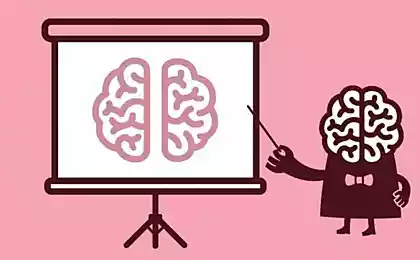211
Psychological facts to delay old age
Our brains are an amazing thing. Scientists have not yet been able to study it completely, although we already know that the potential is much greater than we think. Everyone has growth opportunities and that is inspiring. The website has collected the most incredible psychological facts about our brain to share with you and motivate you to develop. The more we know about how man works, the better we will understand ourselves.

All people are different, but there are general principles by which our behavior is built. It can be the habits of generations, instincts from cave times or the ability to think, which man has mastered thousands of years later. Over the last couple of hundred years, we've been able to look under the hood and see how things really work. For your attention, seven amazing facts about our thinking.
Why are smart people modest? In 1999, two social psychologists discovered an interesting fact: smart people are more likely to underestimate their abilities. Meanwhile, people with low intelligence, on the contrary, overestimate themselves. For example, a person learns to draw. At first, it may seem that it turns out quite well. After some time, a developed person will realize that he does not know much about drawing and will think: “I am not good enough, I have something to work on.” But people with low intelligence are not able to adequately assess their abilities. They’ll think they’re geniuses, but the opposite is true.

Do you remember your earliest memories? Most often, a moment comes to mind from kindergarten or one of the first birthdays. Can we really remember what happened so long ago? Our memory works very differently than most people think. We do not remember the event itself, but the last memories of it. Every time the brain overwrites what we remember. That is why events are distorted and we are not able to know exactly what happened.

Music changes perception Cheerful music is able to cheer up, and sad - to support in a difficult moment. However, in addition to mood, it significantly affects how we perceive the world. In 2011, a group of people were asked to listen to sad music and choose photos of people with happy faces. The participants in the experiment had difficulty identifying positive emotions. In all the pictures they saw sadness. This means that the music was able to make them see things that were not there. This effect is called “perception expectation”: the brain expects the eyes to see something similar to what it hears with the ears.

Learn to think in a different language Everyone wants to make the right decisions. To make a good choice in a difficult situation, try to think in another language. Unusual language seems to cut off the emotional side of the question. Then you add more logical judgments to your conclusions. The next time you need to make an important decision, try writing down the pros and cons in another language, for example, in English.

Sarcasm is good for the brain People who use sarcasm are more creative. Sarcasm indicates that a person’s thinking can go beyond the usual. Biologically, such humor requires more effort, as you need to quickly grasp the meaning, tone and mood of the joke. Therefore, sarcasm can develop creative and abstract thinking.

How do you feel after 10 to 11 hours of sleep? You give your brain a lot of time to rest, but you still wake up tired. Sometimes you may feel like you haven’t slept well. Too much sleep is bad for the body, as is lack of sleep. The problem is that the biological clock is broken. You can imagine that the sleep cycle is a jump in which you need to land on your feet in time. All it takes to get a good night's sleep is the ideal sleep rate, no more, no less.

Everyone knows the feeling of fatigue after a working day. You are indoors all day, but when you go outside, your mood improves dramatically. In addition to the fact that sunlight warms the body, it can also prevent depression or apathy. Vitamin D, which is produced in the body under the influence of sunlight, stabilizes mood and promotes the release of happiness hormones. Therefore, people who live in countries with less sun are more prone to bad moods and irritability. Sunshine and clean air are great for lifting the mood - tested in practice.

I am inspired by the fact that there is so much more interesting in the world. We are on the verge of great discoveries in psychology, neuroscience and medicine. Who knows what else we can learn about ourselves? The Greek philosopher Socrates once said, “I know that I know nothing.” His words are very relevant today: perhaps all we know is just the beginning of the journey.

All people are different, but there are general principles by which our behavior is built. It can be the habits of generations, instincts from cave times or the ability to think, which man has mastered thousands of years later. Over the last couple of hundred years, we've been able to look under the hood and see how things really work. For your attention, seven amazing facts about our thinking.
Why are smart people modest? In 1999, two social psychologists discovered an interesting fact: smart people are more likely to underestimate their abilities. Meanwhile, people with low intelligence, on the contrary, overestimate themselves. For example, a person learns to draw. At first, it may seem that it turns out quite well. After some time, a developed person will realize that he does not know much about drawing and will think: “I am not good enough, I have something to work on.” But people with low intelligence are not able to adequately assess their abilities. They’ll think they’re geniuses, but the opposite is true.

Do you remember your earliest memories? Most often, a moment comes to mind from kindergarten or one of the first birthdays. Can we really remember what happened so long ago? Our memory works very differently than most people think. We do not remember the event itself, but the last memories of it. Every time the brain overwrites what we remember. That is why events are distorted and we are not able to know exactly what happened.

Music changes perception Cheerful music is able to cheer up, and sad - to support in a difficult moment. However, in addition to mood, it significantly affects how we perceive the world. In 2011, a group of people were asked to listen to sad music and choose photos of people with happy faces. The participants in the experiment had difficulty identifying positive emotions. In all the pictures they saw sadness. This means that the music was able to make them see things that were not there. This effect is called “perception expectation”: the brain expects the eyes to see something similar to what it hears with the ears.

Learn to think in a different language Everyone wants to make the right decisions. To make a good choice in a difficult situation, try to think in another language. Unusual language seems to cut off the emotional side of the question. Then you add more logical judgments to your conclusions. The next time you need to make an important decision, try writing down the pros and cons in another language, for example, in English.

Sarcasm is good for the brain People who use sarcasm are more creative. Sarcasm indicates that a person’s thinking can go beyond the usual. Biologically, such humor requires more effort, as you need to quickly grasp the meaning, tone and mood of the joke. Therefore, sarcasm can develop creative and abstract thinking.

How do you feel after 10 to 11 hours of sleep? You give your brain a lot of time to rest, but you still wake up tired. Sometimes you may feel like you haven’t slept well. Too much sleep is bad for the body, as is lack of sleep. The problem is that the biological clock is broken. You can imagine that the sleep cycle is a jump in which you need to land on your feet in time. All it takes to get a good night's sleep is the ideal sleep rate, no more, no less.

Everyone knows the feeling of fatigue after a working day. You are indoors all day, but when you go outside, your mood improves dramatically. In addition to the fact that sunlight warms the body, it can also prevent depression or apathy. Vitamin D, which is produced in the body under the influence of sunlight, stabilizes mood and promotes the release of happiness hormones. Therefore, people who live in countries with less sun are more prone to bad moods and irritability. Sunshine and clean air are great for lifting the mood - tested in practice.

I am inspired by the fact that there is so much more interesting in the world. We are on the verge of great discoveries in psychology, neuroscience and medicine. Who knows what else we can learn about ourselves? The Greek philosopher Socrates once said, “I know that I know nothing.” His words are very relevant today: perhaps all we know is just the beginning of the journey.
What happens if you wear a hair gum on your wrist?
Plan of action if in the car of the spouse noticed an unfamiliar guest
























